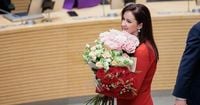On Tuesday, August 26, 2025, Lithuania’s parliament took a decisive step in its political evolution, confirming Inga Ruginiene as the nation’s new prime minister. The appointment, which followed weeks of political turbulence and public scrutiny, marks a significant moment for the Baltic state as it navigates both internal challenges and growing international pressures.
The confirmation process itself was closely watched. According to the Lithuanian public broadcaster LRT, 78 members of the Seimas—the country’s parliament—voted in favor of Ruginiene’s appointment, with 35 opposed and 14 abstaining. She is set to formally assume her role after President Gitanas Nauseda signs the necessary decree and she takes the oath in parliament. Within 15 days, as stipulated by law, Ruginiene must present a new Cabinet of Ministers and a government program, both of which require parliamentary approval.
Ruginiene’s rise to the highest executive office is remarkable for its speed and the context in which it occurred. Just last year, she was elected as a lawmaker, having joined the Lithuanian Social Democratic Party (LSDP) in the fall of 2024. Before her entry into politics, Ruginiene was best known as the head of the Lithuanian Trade Union Confederation, where she built a reputation as a strong advocate for workers’ rights. After the Social Democrats’ victory in the parliamentary elections, she was appointed Minister of Social Protection and Labor, a role that positioned her at the heart of Lithuania’s social policy machinery.
The need for new leadership arose after the previous government collapsed in July 2025. Former Prime Minister and LSDP leader Gintautas Paluckas resigned on August 1 amid mounting allegations concerning his past business dealings and ethical breaches. Law enforcement authorities had launched two pre-trial investigations into companies linked to Paluckas, prompting his departure and setting the stage for a new political chapter. According to BBC, the coalition’s collapse was spurred by a corruption scandal that shook public confidence and forced a reckoning within the ruling party.
The new coalition government, led by the LSDP, is a patchwork of political forces. It includes the populist Nemunas Dawn party, the Lithuanian Farmers and Greens Union, the Electoral Action of Poles in Lithuania-Christian Families, and several independent lawmakers. Together, these groups hold 82 of the 141 seats in parliament, with the Social Democrats remaining the largest faction, commanding 52 seats. Notably, the centre-left Democrats “For Lithuania” withdrew from coalition talks, citing their inability to work alongside Nemunas Dawn. The party’s leader, Remigijus Zemaitaitis, had previously resigned his parliamentary seat in 2023 over controversy surrounding alleged anti-Semitic comments but was reelected in the most recent elections.
President Nauseda has voiced his support for the new government, though not without reservations. Speaking to a Lithuanian radio station, he described the inclusion of Nemunas Dawn as “a mistake that was difficult to avoid.” The coalition’s composition has been a source of public debate, with some accusing it of harboring politicians opposed to sanctions against Russia and Belarus, as well as anti-vaccine campaigners. Among the more controversial figures is Waldemar Tomaszewski, head of the Polish-Christian alliance and a European parliament member, who has faced accusations of supporting the Kremlin—allegations he has flatly denied. Another independent deputy, Ignas Vegele, made headlines for his vocal opposition to COVID-19 restrictions and for placing third in Lithuania’s presidential election last year.
Outside the halls of parliament, public reaction to the new government has been far from unanimous. Several thousand people took to the streets to demonstrate against the coalition, expressing concern over its inclusivity and the presence of figures they see as opposed to Lithuania’s pro-Western stance. Organizers of the protest accused the government of including politicians who resist sanctions on Russia and Belarus and who have promoted anti-vaccine sentiment—issues that remain deeply divisive in Lithuanian society.
Despite these challenges, Ruginiene has outlined an ambitious agenda for her government. The coalition’s program prioritizes protecting the population from external threats—an ever-pressing concern given Lithuania’s proximity to Russia and Belarus—and ensuring adequate defense funding. Support for domestic business, improvements in conditions for families, and increased excise duties on tobacco, alcohol, and electronic cigarettes are also high on the list. The government has pledged to combat xenophobia and to provide robust support to Ukraine, both in its fight against Russian aggression and on its path toward integration into the European Union and NATO.
Ruginiene herself has emphasized the importance of international relations. She has promised to maintain good ties with Poland, with her first foreign visits planned for Warsaw and Kyiv. In a nod to the shifting geopolitical landscape, she also aims to normalize relations with China—a move that could have significant economic and diplomatic implications for Lithuania. “My biggest dream is to stand in front of you again at the end of my mandate and to say that we have been able to accomplish very important work,” she told parliament, expressing a blend of humility and determination as she takes on her new responsibilities.
Her background as a trade union leader and her status as a political newcomer have drawn both praise and skepticism. Supporters see her as a fresh face untainted by the corruption scandals of the past, with a track record of advocating for ordinary Lithuanians. Critics, however, question her lack of experience in high-level politics and the challenges she will face in managing a coalition with such diverse—and sometimes conflicting—interests.
As Lithuania’s new prime minister, Ruginiene will need to navigate a complex political landscape, balancing domestic priorities with the demands of international diplomacy. The coalition’s commitment to strong support for Ukraine and integration with Western institutions signals continuity in foreign policy, even as internal divisions threaten to complicate governance. The coming weeks will be critical, as Ruginiene assembles her cabinet and seeks to build consensus around her government’s program.
For Lithuania, the appointment of Inga Ruginiene as prime minister is more than a change in leadership—it’s a test of the country’s ability to renew itself in the face of adversity, to heal political wounds, and to chart a course toward stability and growth.

